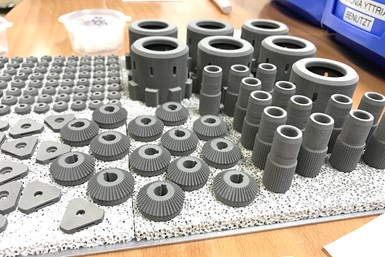Tritone, DSH Technologies Launch Outsource Sintering Furnace-Access Program
Through the Furnace-Access program, Tritone customers will have immediate access to Elnik sintering furnaces and metallurgy expertise with no upfront capital investment or additional staffing required.
Tritone Technologies and DSH Technologies are collaborating to lower barriers and accelerate the adoption of Tritone’s MoldJet Technology. As part of the recently launched Furnace-Access program, Tritone customers will have immediate access to Elnik sintering furnaces and metallurgy expertise with no upfront capital investment or additional staffing required.
MoldJet and other sinter-based metal additive manufacturing (AM) technologies are said to have tremendous potential to reduce part costs and drive exponential industry growth. However, the capital expenses needed for a high-capacity industrial sintering furnace can be a barrier to entry for some prospects. DSH is addressing this challenge by functioning as a complete outsource sintering department with world-class equipment, staff and quality reporting.
“Our collaboration with Tritone started with them shipping hundreds of green parts from Israel to our plants in the USA and Germany,” says Stefan Joens, DSH Technologies vice president. “The strength and durability of the MoldJet green parts were very similar to the MIM parts we have processed for years at DSH. They survived shipping from halfway across the world and fit right into our standard workflow. DSH started to serve this need across the MIM and Additive Industries, and the Tritone partnership is a natural fit. We’re excited to support Tritone and its customers.”
The Furnace-Access program enables customers to match their investment timeline and learning curve to their business ramp rate. Program members also have direct access to the DSH staff’s metallurgical expertise. Members can outsource their sintering as a long-term strategy or can transition to owning and operating their own equipment as demand grows. DSH can help each customer build out an in-house sintering capacity with all the equipment and training needed for success.
“Tritone’s use of DSH sintering services over the years in the U.S. and Europe has been a home run success,” says Ben Arnold, Tritone vice president business development NA. “We have proven that MoldJet green parts can be shipped and processed reliably by a third party. This is an important competitive advantage our customers can leverage to get started and to level their furnace loading as they grow.”
Specialized metal work processes such as heat treating and HIP have been outsourced for decades. With the innovation of MoldJet and its rugged green parts, metal AM sintering is now in this same category. Using an outsource service relationship for sintering is an option many companies can consider to reduce risks when entering the metal AM market.
- Read about Tritone opening North American subsidary to strengthen its corporate foothold in North America.
- Learn about APG is utilizing Tritone’s MoldJet Technology for metal parts production. It is said APG delivers highly engineered powder metal, metal injection molding (MIM) and AM components, serving a diverse customer base with a range of high-performance applications.
Related Content
-
Do Distributors Dream of Digital Inventory? Würth Additive Group Does
It’s more than a dream for Würth Additive Group and its parent company, in fact. Along with supplying additive equipment, the group is now developing solutions for sourcing 3D printed parts in a reliable, elastic digital inventory model.
-
Beehive Industries Is Going Big on Small-Scale Engines Made Through Additive Manufacturing
Backed by decades of experience in both aviation and additive, the company is now laser-focused on a single goal: developing, proving and scaling production of engines providing 5,000 lbs of thrust or less.
-
Big Metal Additive: The Difference Between a Shape and a Part Is Quality
Preparing to scale directed energy deposition to ongoing full production is not a technological challenge: DED is ready. But it is an organizational challenge, says the company founder. Here is what it means to implement a quality system.















